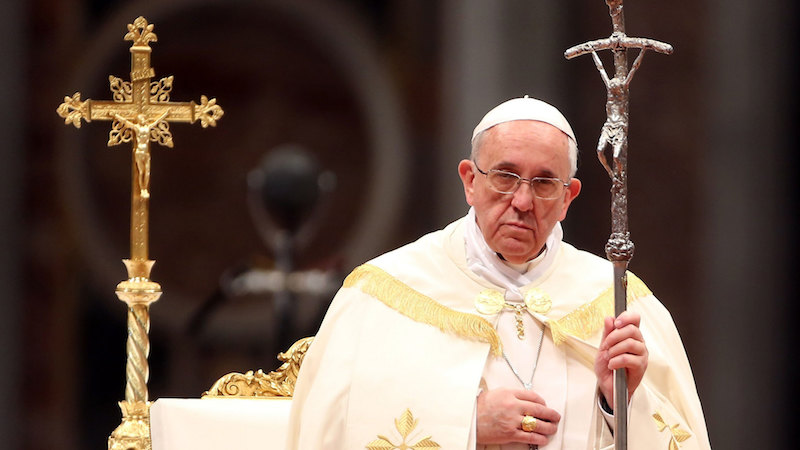Following their tense and grumpy meeting this week the Pope cheekily presented Donald Trump with a parting gift: his 165-page Encyclical on Care for our Common Home, better known as Laudato Si, in which he outlines his commitment to action on climate change.
Trump’s face, shared widely on social media, hardly suggests any great delight and we cannot expect that a dense theological text will trigger his climate epiphany
But then Trump was never the intended audience. The critical question is whether, in the two years since it was released ahead of the Paris climate conference, the papal encyclical has shifted opinion among Catholics. And unfortunately the answer is “probably not”.
On the face of it the encyclical should have been a key moment in galvanising global action. Climate change is a complex issue around which people require clear guidance – what social theorists call “elite cues” – from trusted high profile figures. And who could be more trusted to the world’s 1.2 billion Roman Catholics than the leader of their church?
But climate change is also an exceptionally politically divided issue. A team at the University of Queensland recently reviewed surveys in over 56 countries and concluded that political orientation was by far the largest determinant of attitudes to climate change. Nowhere is this more the case than in the United States where attitudes to climate change are more strongly divided between left and right than any other single issue – including such hot button topics as gun control and abortion.
Climate Weekly: Sign up for your essential climate news update
Three major US studies have found that liberal Catholics were far more motivated and inspired by the encyclical than conservative Catholics. The most recent study, published last week in the International Journal of Cognitive Science, concluded that “encyclical messages were processed through the perceptual filter of political ideology”. We have no research on the response of Catholics outside the United States but can be reasonably confident, based on wider research on climate change attitudes, that these findings could extend to other developed countries.
What was more surprising, though, was that the encyclical actually increased polarisation. Research by Yale University found that following the publication of the encyclical the number of Catholics who strongly trusted the Pope as a source of information about global warming increased by a quarter. The number who strongly distrusted him doubled.
Scanning the language of Laudato Si reveals one of the fundamental problems: in every way it speaks to and embodies left-wing values and frames. Growth and affluence are condemned at every turn and the transformative opportunity of renewable energy (indeed, the word “opportunity” itself) are mentioned only once. The framing of “justice”, which research by Climate Outreach and University of Wales has found to among the most politically polarising, is used throughout.
Maybe this is understandable: after all “social justice” is one of the key terms in Catholic social teaching. Less explicable is the abstruse focus on what Pope Francis calls “integral ecology” – the word “ecology” is used over 80 times. The canticle of St Francis of Assisi, with its praise for Sir Brother Sun, Sister Moon and Mother Earth, inspired his papal namesake so much that it is enshrined in the text. It might be well-suited to an eco-activist circle but it hardly speaks well to the values of urban conservatives.
Thankfully few people will get that far. Donald Trump is notoriously uninterested in reading anything at all but even dedicated readers will find it hard to wade through this dense and verbose text. As with any church teaching, it is only through simplification and then diffusion through sermons and church publications that it will become salient to ordinary Catholics.
But this is where we can see the greatest disappointment. In a survey by Yale University only 18% of Catholics said that the Pope’s views on global warming had been discussed in their church after publication. The encyclical evidently failed to break through the barriers of collective silence that remove climate change from the domain of public awareness.
So maybe on reflection this should, and still could, have been done better. The encyclical is, I fear, far beyond the influence of any communications professional. But it should be supported by a wide range of more engaging materials to communicate its meaning to individual Catholics, and, most especially, to enable individual priests to speak on the subject from the pulpit.
All wider research confirms the critical importance of conversations between trusted peers in forming attitudes. The Catholic Church has greater influence than any other organised religion over the conversations that take place within its network. It should use this power to require all churches to openly discuss and consider the arguments of the encyclical.
Thankfully politicians like Donald Trump fade with each election cycle and the battle against climate change will ultimately be won by reaching the public who vote for them. The struggle to energise the world’s Catholics has only begun, and requires a far more creative and energetic approach than a single heavy report.
George Marshall is co-founder and director of projects at Climate Outreach
